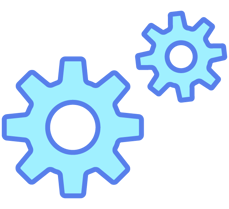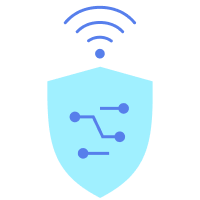Connecting market players and digitizing post-trade to eliminate risk and manual reconciliation for digital securities
Download PDF version
The challenge: Automating paper-based, manual process through post-trade digitization
For years, stakeholders in the financial service industry have been talking about digitizing transactions across the value chain. But regulatory and technology barriers have been slow to fall—until recently.
When German regulators dropped the requirement for market participants to issue paper certificates for a large portion of securities, Deutsche Börse, a leading European financial marketplace and infrastructure provider, saw the opportunity to finally automate, streamline, and optimize a wide range of post-trade activities, including issuance, custody, settlement, and asset servicing for digital securities.
In the past, these processes could take days to complete, because they could not be handled digitally and involved data from multiple, incompatible systems. They also added significant risk and cost to routine, low-value tasks. In the reconciliation process, for instance, message-based communication required manual validation of receipt of assets, which could result in delays and errors.
Stronger digital vaulting technology and advancement in distributed ledger technology (DLT) have made clear that now is the time to build a system for the future. Specifically, Deutsche Börse sought to:
|
.png?width=207&height=207&name=Data%20and%20privacy%20(1).png)
Eliminate inefficient and manual post-trade processes
|

Evolve beyond legacy tech and message-based communication
|

Automate straight-through processing for the entire value chain of digital securities
|
Further, the strategy called for the development of D7, digital securities platform based on hybrid technologies that enables market stakeholders to more easily and efficiently interact with the exchange and other partners. All transactions are captured on a fully traceable and auditable chain with automated and event-based communications.
The solution: A phased approach to designing and building an interoperable post-trade platform
The design principles for D7 are based on leading practices and proven technology, including:
|
.png?width=198&height=198&name=Data%20and%20privacy%20(1).png)
Data centricity and application-level interoperability, with data and assets across products, services, and systems
|

Common data models, with complete description of data, interpretation, and logic
|

Flexible ledger model to cover a wide range of use cases
|
|
.png?width=203&height=203&name=Data%20and%20privacy%20(1).png)
Infrastructure built and connected via Daml, Digital Asset’s open-source, smart contract language and multiparty blockchain application platform
|

Connectivity via APIs or nodes, so that financial services organizations can connect in ways that align to their business models, customer base, transaction volumes, and budgets
|
As important as these attributes are to long-term success, the development approach is even more important. Recognizing the need to build for widespread adoption, Deutsche Börse has adopted a phased approach that minimizes common development and implementation challenges. Further, to ensure market needs are addressed, a group of strategic technology partners, including Digital Asset, are collaborating directly with stakeholders from across the financial services community.
Clearstream, Deutsche Börse’s post-trade service provider, and key market participants have gone live with first digital securities issuances in Germany. This breakthrough enables same-day issuance and represents a major step towards digital financial markets. D7 is fully integrated within Clearstream’s global infrastructure and works as a connector between established networks and digital capabilities.
Historically, German securities had to be issued as paper-based global notes and stored in a physical vault at the central securities depository, which could take up to several days. In 2021, German regulators passed the Electronic Securities Act (eWpG), allowing dematerialised issuance and paving the way for automation in the securities lifecycle. Since December 2021, Deutsche Börse has been processing dematerialised securities via a central register, the first live D7 component.
Powerful outcomes: Near-term efficiencies and long-term innovation
D7 enables faster asset and product origination and lifecycle management. It also provides the increased flexibility to develop new use cases and adapt to shifting regulations and new market needs. D7 complies with the new eWpG legislation that allows the issuance of electronic securities. It enables same-day-issuance and paperless, automated straight-through processing for the entire value chain of issuance, custody, settlement, and asset servicing for digital securities. The new platform allows for significant reduction of cost per unit and operational risks, and it will lead to reduced legal and back-office costs.
KfW, a German state-owned investment bank, is the first issuer to have launched a digital fixed-income bond in the form of central register security. Since then, dozens of other have issued fixed income instruments via D7. The issuance was carried out by Clearstream on the D7 digital post-trade platform. The transaction involves a bond with a volume of EUR 20 million, a term of two years, and a 2.381% rate.
“In line with our core mission to run innovative and future-proof infrastructures for our customers and the entire industry, we have now created the smart digital security. This moves issuance of financial products from days to minutes and enables our clients and partners to quickly adapt to the changing market environment. We are accelerating time to market and unlocking an entire new universe of product opportunities as we continue to venture towards fully digitized markets.”
.jpeg?width=120&height=120&name=jenshachmeister%20(1).jpeg)
Jens Hachmeister
Head of Issuer Services & New Digital Markets, Clearstream
An eye to the future: Digitizing additional asset classes and growing new markets
"Following the successful launch of our structured products offering, we are now enhancing D7 to include the digital issuance of debt securities, such as commercial papers and straight bonds," Hachmeister said. Clearstream provides a fully digital alternative to conventional physical issuance for around 80% of German securities. The scope of this new D7 offering includes warrants and certificates with further asset classes and jurisdictions planned in the future, in compliance with regulatory frameworks. The digital issuance of financial products via the D7 platform shortens the extensive and multi-day issuance process to just a few minutes, saving time, manual effort, and processing costs. As a next step, Clearstream plans to enhance D7 with decentral capabilities and to offer it in further jurisdictions, like Luxembourg, in line with the respective regulations and market interest. In this way, the central securities depository is creating a fully digital alternative to conventional securities issuance.
In February 2023, Deutsche Börse announced that Google Cloud will become their preferred partner for cloud consumption for the next ten years and help to further enhance the group’s cloud adoption and efficiency. Deutsche Börse Group will leverage Google Cloud’s secure infrastructure and leading data and analytics capabilities to accelerate the development of D7, innovate its digital asset market operations, and enhance its data distribution and data use cases in the cloud.
With the development of D7, Deutsche Börse is marking a new era of digital financial market infrastructure that will have benefits far beyond lower costs, reduced risk, and faster cycles. New technology that delivers broad network efficiency will make new business models, products, and services a reality as more financial services organizations have the power to innovate at scale. Yuval Rooz, co-founder and CEO of Digital Asset, added, “The shared vision with Deutsche Börse not only enables interoperability between financial institutions, but also brings greater levels of efficiency, security, and transparency to both the German and broader global financial markets.”